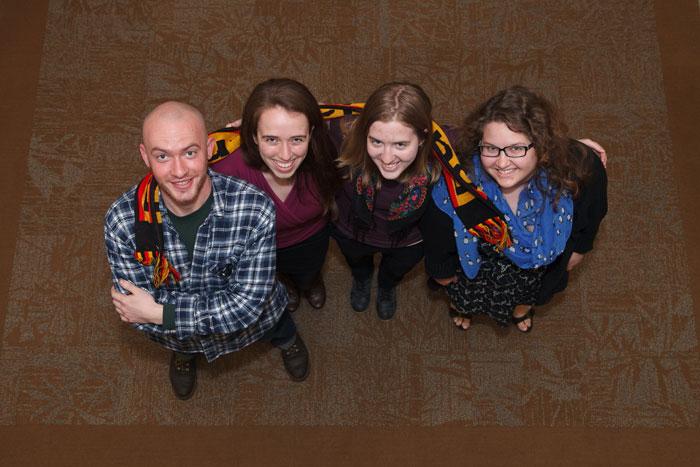Fulbright Scholars Find Success
The 2015 Fulbright recipients, from left: Eric Neumeister, Anna Leistikow, Janie Feldmann and Olivia Harper Wilkins.
Four Dickinson students have received Fulbright Fellowships to Germany. On Monday, February 18, seniors Anna Leistickow, Jane Feldmann, Eric Neumeister and Olivia Wilkins received emails from the Institution of International Education stating that they had been chosen for the Fellowship.
Leistickow, Feldmann and Neumeister will be placed as English Teaching Assistants, said Feldmann. “I will be an English Teaching Assistant Scholar in Germany, where I will be placed in a German high school to teach English language and culture.” Wilkins, however, was given the U.S. Student Program Academic Grant. “I plan to do astrochemistry research. Specifically, I’m hoping to compile information about complex organic molecules in cold environments (30 Kelvin) at frequencies for which there isn’t a lot of information currently. This information would then be used by astronomers and other astrochemists to identify unknown species in galactic molecular clouds,” said Wilkins. She added, “One thing that I think is pretty cool about what I’m
st summer, I was at the Harvard-Smithsonian Center for Astrophysics using information from the Cologne Database for Molecular Spectroscopy. In Germany, I will be on the other side of the database at the University of Cologne, putting information into–rather getting information from–the database. It will be pretty cool to see both angles of the research.”
Both Wilkins and Feldmann noted that their Dickinson experience helped them succeed. “I couldn’t have done it without the professors who helped me. Sarah McGaughey and Wendy Moffat encouraged me to apply in the first place and then guided me through the process of writing, which began May 2014 when I was still abroad in Bremen,” said Feldmann. She elaborated, “Over the summer I worked on several drafts of the application in order to prepare it for the October submission so just having that support along the way was crucial to the process itself.”
Wilkins echoed Feldmann saying, “Dickinson definitely prepared me for this. Most of my professors didn’t even know astrochemistry was a thing until I did some summer research in the field, but they had given me the tools–in true liberal arts fashion–to use what I had learned however I wanted.” She continued, “I’ve never taken astronomy, but I’ve done two summers of astronomy research. Dickinson has shown me the importance of being creative and asking good questions, two things I will definitely need in Germany.”
When asked what advice she would give students looking to apply for the fellowship, Feldmann said, “I would say be prepared to give it your all, to really work hard on it, so no matter what result you get you’ll have something to be proud of. Because whether or not you win the award the process is really fulfilling because you learn to express what you’re really passionate about and that will remain even if you don’t get the award.”
Earlier in the year, Dickinson was named a top-ten Fulbright producing school. According to Sarah McGaughey, Associate Professor of German and Fellowship Advisor, “Each year Fulbright identifies schools based on the number of students selected for Fulbright. For the current year that was a bit delayed. Out of 18 applicants from the past year, five won awards, which places us in the top 10. We tied for 10th as a liberal arts school, and this was the sixth year of that status.”
This success is because of Dickinson’s global focus, McGaughey believes. “At Dickinson, there is real prominence in our global programs and in multilingual instruction, which are aspects that are helpful during the application process. Students’ abroad experiences and our global-oriented faculty help create successful Fulbrights.” She added, “Regardless, it puts students in a good place.”
McGaughey has some advice for students interested in applying for a Fulbright Fellowship. “It is crucial to begin early with the application, about late April. We ask students to write throughout the summer and keep up with materials. The deadline is usually in October,” she said. Stressing the importance of collaborating with professors on campus, she added, “Part of the process includes on-campus interviews with faculty. Some students interview with faculty whose research is relevant to their application, while others talk to multilingual professors for advice about teaching and pedagogy.” She noted, “The most important factor is that as students, you have to go through the on-campus process. You can’t just apply for a grant on your own.”
According to McGaughey, the ideal research applicant will have connections abroad, and English Teaching Assistant applicants will have some teaching experience. Of the overall experience, she said, “Most students say that the long process allows them to craft a better understanding of their interests, and they can learn about what they want to do and how to convey that.”
Regardless of the award, McGaughey said, “It is a joy to work with students, and I am confident that the process is a success in itself, whatever the outcome.”






